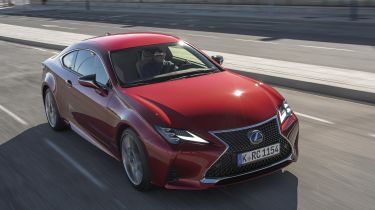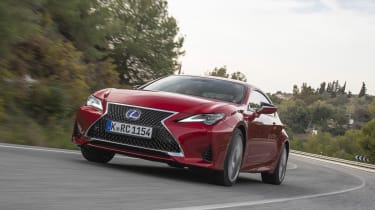Lexus RC review - Engines, performance and drive
Hybrid is smooth and efficient, but turbo petrol disappoints. RC’s weight blunts performance and handling, so it’s more of a cruiser

The RC’s powertrain is found elsewhere in the Lexus range – it comes from the IS saloon – so there are no real surprises. The Japanese brand is well known for doing things a little bit differently to its German rivals, and you can feel that when you get the RC on the road.
It plays the traditional Lexus trump cards of refinement and smoothness pretty well. Wind and road noise are never noticeable, and the engines are whisper quiet most of the time. The only noise that occasionally intrudes is from the suspension, where big bumps around town can send a slight thud through the car, especially on the larger 19-inch wheels found on higher spec versions.
The RC is more firmly set-up than the IS, but apart from some lumpiness around town it’s never uncomfortable. It settles down at speed, too, and is an exceedingly smooth motorway cruiser, especially in models with the adaptive dampers. The Mercedes C-Class Coupe is even more composed, however, and specced correctly it feels less brittle over potholed streets.
Lexus has worked on the RC to give it a sportier, more engaging feel than the IS saloon. It’s not massively successful in this regard, though, especially with the high standard set by rivals. The steering is well-weighted and more direct than you might expect, but quick driving exposes a numbness to the controls. Up the pace and body control suffers too, with the initially sharp turn-in giving way to a heavy, lumpen feel. Given that the RC is around 170kg heftier than the equivalent BMW 4 Series, that’s to be expected.
More reviews
The hybrid is even heavier due to the battery pack, and body roll is more noticeable than in the turbo petrol. The adaptive dampers go some way to rectifying this in ‘Sport S+’ mode, reducing roll, but it’s still some way away from the composure of the best cars in the class. Grip levels are strong, however.
The RC received steering and suspension tweaks with its 2019 facelift – these have brought sharper turn-in and a more polished ride than before, but the RC is still no match for the BMW 4 Series when it comes to outright fun. The torque-vectoring differential helps it enter and exit corners smoothly, but grip levels aren’t much to shout about. It’s comfortable at a cruise, however, and is one of the most refined performance cars out there.
Engines
There’s just one engine available, a 2.5-litre petrol-hybrid badged RC 300h. Lexus quotes 8.6 seconds to 62mph and top speed is limited to just 118mph. The hybrid's CVT gearbox is particularly frustrating for keen drivers, as it’s too eager to send the revs soaring to an intrusive drone when you press the throttle. There are ‘virtual’ ratios, but there’s often a delay when selecting them via the steering wheel-mounted paddles, plus the transmission still constantly alters the gearing.
The downside is that the RC 300h gets noisy and sluggish if you demand all of its performance at high speed, but the RC is no sports car. The electric motor gives you instant torque and it can run on electric-only mode for a few miles around town.
The RC F’s naturally-aspirated 471bhp V8 makes a great noise and is a real firebreather when revved. It’s certainly more characterful when you’re in the mood than the turbocharged BMW M4. The trade off is a sluggish feeling at low revs, which combines with the weight to make the RC F a car you need to work surprisingly hard to get going.








